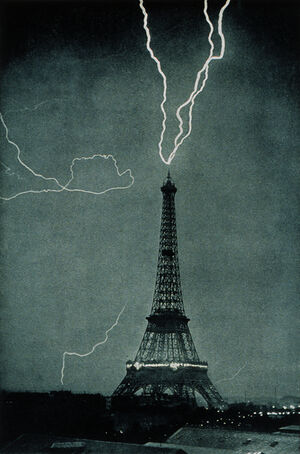Lightning (nonfiction): Difference between revisions
Jump to navigation
Jump to search
No edit summary |
No edit summary |
||
| Line 5: | Line 5: | ||
The charged regions in the atmosphere temporarily equalize themselves through this discharge referred to as a strike if it hits an object on the ground, and a flash if it occurs within a cloud. | The charged regions in the atmosphere temporarily equalize themselves through this discharge referred to as a strike if it hits an object on the ground, and a flash if it occurs within a cloud. | ||
Lightning causes [[light | Lightning causes [[light]] in the form of plasma, and sound in the form of thunder. | ||
Lightning may be seen and not heard when it occurs at a distance too great for the sound to carry as far as the light from the strike or flash. | Lightning may be seen and not heard when it occurs at a distance too great for the sound to carry as far as the light from the strike or flash. | ||
Revision as of 11:53, 4 June 2016
Lightning is a sudden electrostatic discharge during an electrical storm between electrically charged regions of a cloud (called intra-cloud lightning or IC), between that cloud and another cloud (CC lightning), or between a cloud and the ground (CG lightning).
Description
The charged regions in the atmosphere temporarily equalize themselves through this discharge referred to as a strike if it hits an object on the ground, and a flash if it occurs within a cloud.
Lightning causes light in the form of plasma, and sound in the form of thunder.
Lightning may be seen and not heard when it occurs at a distance too great for the sound to carry as far as the light from the strike or flash.
Nonfiction cross-reference
Fiction cross-reference
External links
- Lightning @ Wikipedia
